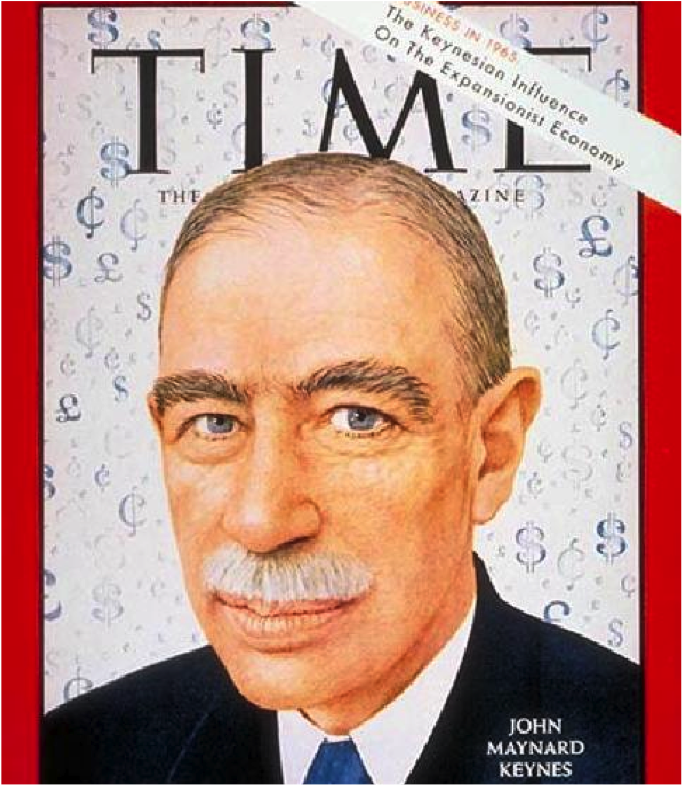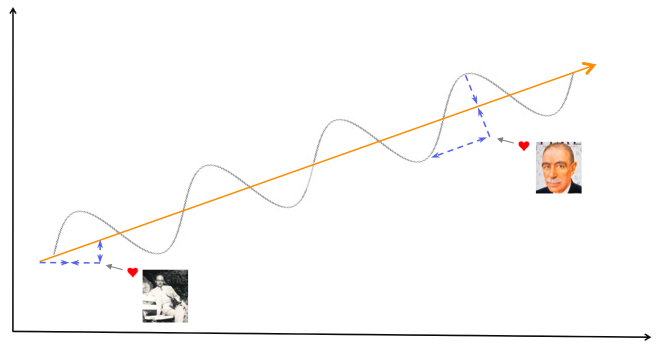Keynesian Schumpeterianism
Albert Wenger penned a pithy line a couple months ago about the possibility of "more governance (broader role) while at the same time having “less government” (fewer dollars)." It spurred me to dust off some of my own thinking on the role of government in propelling our economy. It stems from a simplistic understanding, cherry-picking and eventually melding of two legendary economists' theories, traditionally considered at odds with another:


Among champions of innovation and entrepreneurship, the gentleman on the left, Joseph Schumpeter, is a hero. He made the term "creative destruction" popular and is often credited with being one of the first to apply economic theory to entrepreneurship, and vice versa. In this context Schumpeter's thinking can be boiled down to:
- Dramatic leaps in innovation are required to sustainably drive productivity, which is the root force behind economic growth.
- Disproportionate, short-term rewards are necessary to provide incentive for risk-takers to pursue such innovation.
On the other hand, John Maynard Keynes, the mustachioed fellow on the Time cover, is frequently associated with the notion of active fiscal management to mitigate downsides of business cycles. Keynesians traditionally believe:
- All-out free markets tend to cause a lot of pain (i.e. extended periodso of high unemployment) in the real world.
- You can manage these downturns by saving on sunny days and spending on rainy days, even with money you don't have.
As you can imagine, pro-business types and entrepreneurs tend to take more to Schumpeter. And how can you blame them – the guy allegedly wore a cape on a regular basis, and clearly was a bit of a badass (for an economist):
Schumpeter claimed that he had set himself three goals in life: to be the greatest economist in the world, to be the best horseman in all of Austria and the greatest lover in all of Vienna. He said he had reached two of his goals, but he never said which two although he is reported to have said that there were too many fine horseman in Austria for him to succeed in all his aspirations.
Let a playa play!
Keynes by comparison was "the guy trying to turn the party down just as Schumpeter was coming in from the kitchen with another bottle of tequila."
As our government is making decisions on economic and budgetary policy and people continue to debate “Schumpeter or Keynes?” (or some equivalent)…I think the answer is a resounding “Yes.” It’s seductive to go all in on the idealism and theory of the former. The reality is that we as humans are subject to non-rational, non-efficient behaviors and outcomes. This in turn leads to 'non-linear strife' and possibly even societal unrest during extended periods of suffering, so pragmatically the two schools of thought must go hand in hand. At least until Ray Kurzweil is proven right.
If you think about it graphically, Schumpeterians focus on uninhibited innovation – even at the cost of periodic destruction – driving sustainable economic growth [sine wave with upward slope], while Keynesians are concerned with minimizing volatility [lower amplitude, lower frequency]. Putting the two together, one can see they need not be mutually exclusive and that it’s not unreasonable for government to explicitly set and manage to economic goals based on both ideals:
 With all the political bickering and lingering problems with the economy, I'm hoping policy makers and voters can appreciate a more holistic view, and that largely their arguments are two sides of the same coin...(or wave, as it were). Maybe to some that's been clear all along, but I sense that most in this country are exposed only to talking points from one extreme or the other. The truth is, even Keynes and Schumpeter themselves it turns out had a genuine, if grudging, admiration of one another:
With all the political bickering and lingering problems with the economy, I'm hoping policy makers and voters can appreciate a more holistic view, and that largely their arguments are two sides of the same coin...(or wave, as it were). Maybe to some that's been clear all along, but I sense that most in this country are exposed only to talking points from one extreme or the other. The truth is, even Keynes and Schumpeter themselves it turns out had a genuine, if grudging, admiration of one another:
Schumpeter...told his students...that Keynes's work had totally superseded his own earlier writings on money...Keynes, in turn, considered Schumpeter one of the few contemporary economists worthy of his respect.

Aww.
 March 20, 2011 |
March 20, 2011 |  Post a Comment
Post a Comment
Reader Comments